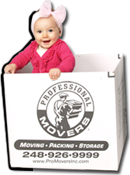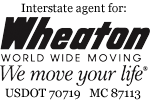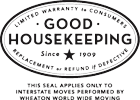
Professional Movers.com is your best choice for International relocations. We can relocate families, employees and businesses with ease and efficiency anywhere in the world. As your local contact here in Michigan, we can relocate your goods with ease because we have a global reach that extends to all four corners of the world.
Our international team is are well trained to handle all of your relocation needs. We are an international moving company providing door-to-door relocation services. Some of our relocation services include packing, organizing the logistics of an international move, storage and transportation. We will prepare all of the necessary documentation and handle customs clearance. Once your belongings have arrived in their destination country, we will deliver your valuables to your new location and assist you with unpacking and even get acclimated to your new environment. Our International experts manage every detail of an international relocation, to provide you with a “Worry Free” experience.
What are Professional Movers.com International global capabilities?
- Transportation to and from anywhere in the world!
- Door to Door service
- Single Point of Contact Customer Service process
- Ocean Freight
- Air Freight
- Consolidated Air & Sea shipments
- Highly trained and experienced international crews
- Export Documentation
- Translation Services
- Short & Long term storage
- Temporary Housing arrangements
- Furniture Rental program
- Legalization of Documents
- Custom packing and crating
- Project Management
Professional Movers.com International division believes that each move is unique. We will design a custom relocation solution to meet your specific requirements. You will find that by working with us, we will be with you every step of the way and since we are located right here in Michigan you will be dealing with a local company that has your best interests in mind. Expect the best from your international mover. Expect the highest quality service and expect a cost-effective move plan. Learn more about how Professional Movers.com can handle your next international relocation below:
International Moving Accreditations: Learn more about Professional Movers.com various accreditations that make us the best choice for your next international relocation.
Customs Requirements: We are well-versed in various customs requirements to ensure your seamless international relocation.
Destination Services: Discover what Professional Movers.com can do to assist you once you have arrived to your new destination overseas, from home purchase to language training.
Restricted/Prohibited Items: Our comprehensive list of restricted/prohibited items and duty information will best prepare you for any overseas relocation.
Relocating to the U.S.: Learn more about the guidelines on relocating to the U.S. to be prepared for entry into the country.
International Moving Accreditations
AMSA RIM Certified Mover
Professional Movers.com is proud to be a Registered International Mover, as identified by the American Moving and Storage Association. The American Moving and Storage Association (AMSA) has set and manages the world’s most comprehensive program, setting the standards for international moving.
In order to become a certified Registered International Mover (RIM), Professional Movers.com employees went through rigorous training and testing. This training and certification was necessary for all of our employees who are involved in the international moving process including sales people, surveyors, coordinators, packers, craters and loaders.
RIM certification ensures that Professional Movers.com is knowledgeable of all aspects of an international move. Furthermore, Professional Movers must meet specific RIM standards for equipment and facilities to handle a quality international move. These standards are verified by on-site inspection performed by the V.P. of International Programs at AMSA. In order to maintain its RIM certification, Professional Movers.com is required to maintain its quality service to the international moving community and adhere to the RIM code of ethics and principals of conduct.
Member of Household Goods Forwarders Association of America
Professional Movers.com is also proud to be a member of the Household Goods Forwarders Association of America (HHGFAA). The HHGFAA is a global association of forwarders and movers committed to providing customers with the highest level of service available. They maintain a worldwide membership of over 1800 companies from more than 160 countries and territories.
International Moving – Customs Requirements
We know the ins and outs of clearing International Customs…
We also know that making sure that YOU know the ins and outs can make the difference in a smooth transition to your new host country! One small indiscretion can mean that your shipment is delayed for what may be an undetermined amount of time! Just as every relocation is different, so are the customs entry requirements for each country. Customs rules and regulations are also subject to constant change, so it is important that you check regularly for updates.
Professional Movers.com will provide you with the most up-to-date information as you prepare for your relocation. If at any time you have a question, please contact one of our Certified Moving Consultants immediately.
Required Documents
We have provided a number of customs forms to help you with your move, to Australia, the U.K. or the U.S.
These forms are in PDF format, which requires Adobe Acrobat Reader.
- Australian Customs Form B534
- United Kingdom Customs Form C3U
- United States Customs Form 3299
- United States Department of Transportation Motor Vehicle Declaration
- United States Environmental Protection Agency Form 3520-1
- Customs information for other countries
If your move is to or from a country other than these, your Professional Movers.com. International Certified Moving Consultant will provide you with the paperwork required for your particular move.
Customs Regulations
The U.S. Customs and Border Protection agency has created a pamphlet titled Know Before You Go – a must read for anyone traveling internationally – Download the PDF version of this brochure!
This brochure covers topics such as:
- Documents You Will Need
- Items You Must Declare
- Duty-Free Exemptions
- Prohibited & Restricted Items
- Other Travel Related Information
International Moving – Destination Services
Moving to a new country means a wide range of complex questions.
Beyond the normal geography questions of temperature, weather and what to expect of the land, there are many other details that one should be aware of as they enter a new host country. What documents are required for entry? Are there items that can’t be taken? Can my spouse work while we reside there?
We work hard to gather all that information and more! In addition to providing you with information, we can also offer additional global destination services that can help you with many of your arrival needs.
Services available include:
- Home purchase and temporary living assistance
- Financial and insurance provider assistance
- Cross-cultural training
- Language training
- Childcare and school referrals
- Medical care and prescription replacement
- Automobile purchase and services
- Driving lessons
Contact your Professional Movers.com Certified International Moving Consultant for specific details on the country you are moving to. We can also provide you valuable consular contact information to help make settling in just that much easier!
International Moving – Restricted Items
You can’t always take it with you…
Duty is the amount of money you pay on items coming from another country. It is similar to a tax, except that duty is collected only on imported goods.
Dutiable describes items on which duty may have to be paid. Most items have specific duty rates, which are determined by a number of factors, including where you got the item, where it was made and what it is made of.
In most countries, your household goods and personal effects can be entered duty-free. (Note: Some items may be subject to particular provisions.) It’s important to remember that any duties or taxes levied against your shipment are in addition to our charges.
In most cases, you can settle your customs charges with your overseas representative. However, there are times when you’ll be required to deal directly with the customs office. If that’s the case, be sure to obtain an official receipt and keep it, as some duties are refundable when you leave the country.
There are often strict restrictions on what you can and cannot take across the host country’s borders. Guns, alcohol, controlled substances and even certain types of literature are strictly prohibited in certain nations. Your Professional Movers.com Certified International Moving Consultant can discuss this with you well in advance of your move.
In addition, some of your appliances and other electrical items may not work in your new home or may need special adapters. Ask your Professional Movers.com Certified International Moving Consultant which types of electrical devices typically can’t be used outside of your country. You can get useful information on dual voltage travel appliances, foreign electricity converters and adapters and other travel necessities here.
It’s always better to be safe than sorry…
Customs requirements vary greatly from one country to another, and a simple oversight could result in delays, fines or even seizure of your entire shipment by foreign customs authorities.
We’ll do our best to keep you informed of all the changes in customs requirements, but there are some basic elements for you to keep in mind.
To be safe, don’t take any of the following, and if you have any doubts, just leave it behind, or talk to your Professional Movers.com Certified International Moving Consultant .
- Firearms
- Alcohol
- Narcotics
- Agricultural products, including houseplants and seeds
- Pornographic materials and magazines
- Politically sensitive materials
- Open bottles containing liquids
- Flammable cleaning solutions
- Toxic liquid substances
- Pressure spray cans
International Moving – US Guidelines
Clearing Vehicles
To complete the process of clearing your vehicle through customs, you will need any document covering the vehicle, including the carrier’s original bill of lading, the bill of sale and foreign registration. In addition, you should consult your local automobile club or an international automobile federation about obtaining the international Registration Marker – a permit that must be displayed on all imported cars.
Safety and Emission Standards
An auto manufactured abroad may not be in compliance with U.S. safety or emission standards. Therefore, you will be required to produce the foreign manufacturer’s statements verifying that the vehicle conforms with U.S. safety and emission control standards. U.S. emission requirements apply to all 1968 and later model year gasoline-fueled vehicles, 1975 and later model year diesel-fueled vehicles, and motorcycles manufactured after December 31,1977. Since safety and emission requirements sometimes change over the years, it is recommended that you contact one of the resources below for the most up-to-date regulations applying to your vehicle.
For a copy of the free “Introduction Handbook for Complying with Regulations of Imported Vehicles” and for information on safety standards, contact:
U.S. Department of Transportation
National Highway Traffic Safety Administration
Office of Vehicle Safety Compliance, NSA-32
400 Seventh St. S.W.
Washington, D.C. 20590, U.S.A.
National Highway Traffic Safety
Administration Hotline: (800) 424-9393
To call from Canada: (202) 366-0123
Fax: (202) 366-1034
For the EPA’s fact sheet on emission control standards or for other inquiries regarding the importation of a vehicle, contact:
U.S. Environmental Protection Agency
Investigations / Imports Section Manufacturers
Operations Division (EN-340F)
Washington, D.C. 20460, U.S.A.
EPA Hotline: (202) 233-9660
Fax: (202) 233-9596
Below are some other important tips for clearing a vehicle through customs:
The U.S. Department of Agriculture required that all imported cars are free from foreign soil. Consequently, you must have your car steam- sprayed or cleaned thoroughly before shipping.
Do not ship personal belongings in your vehicle.
Any modifications that must be made to a vehicle imported into the United States is based on the price paid or the invoice price. Contact your local customs office for the current duty rate. A returning U.S. resident (one returning from travel, work or study) may apply his or her $400.00 customs exemption (as well as the exemptions of accompanying family members) toward the value of the vehicle if it meets the following requirements:
- The vehicle accompanies you on your return to the States.
- It is imported for personal use.
- The vehicle was purchased during your stay outside the United States.
After this exemption has been applied, the next $1,000.00 of the vehicle’s value is dutiable at a flat rate of 10% and the remainder is dutiable at the regular rate.
You are entitled to import a foreign-made car if you are:
A U.S. citizen employed abroad, or a government employee returning from temporary duty or on voluntary leave. These citizens may import a foreign-made car free of duty provided they claim non-resident status, enter the United States for only a short visit and export the vehicle when they leave the States.
A civilian or military employee of the U.S government returning to the United States at the end of an assignment of more than 140 days may include a conforming vehicle among their duty-free personal and household goods provided the auto was purchased abroad and was in the owner’s possession prior to his departure to the United States. Navy personnel serving a U.S. vessel may be entitled to the free entry exemption after an intended overseas deployment of at least 120 days.
A vehicle may be imported by a non-resident if the vehicle is for personal use and is imported in conjunction with the owner’s arrival. Vehicles conforming to these restrictions may remain in the United States indefinitely. If the conforming vehicle was imported under duty free exemptions, it is dutiable if sold within one year of importation. This duty must be paid before the sale is completed. Non-conforming vehicles may not be sold in the United States and must be exported within one year.
A car imported by a non-resident for purposes other than personal, such as racing, repair or as a sample for taking orders, is subject to specific customs regulations. Check with your local customs office for guidelines pertaining to unusual situations and exceptions.
Federal Tax
Some imported automobiles are subject to the “Gas Guzzler Tax” stipulated in section 4064 of the Internal Revenue Code. Liability for the tax is the responsibility of the individual importing the vehicle and the tax rate is determined by the EPA’s fuel economy rating. (This rating may differ from the fuel economy rating cited by the manufacturer). Additionally, before registering and titling your vehicle, many states require proof that you have paid the “Gas Guzzlers Tax” in cases where it is applicable. For information on the “Gas Guzzlers Tax” contact:
Internal Revenue Service
Room 5314
CC: DOM : P&SI
1111 Constitution Avenue N.W.
Washington, D.C. 20224, U.S.A.
Phone: (202) 622-3130
Fax: (202) 622-4524
You may also contact the ITS for information on determining fuel economy rates. Ask for section 4064 of the Code, Revenue Procedure 86-9,1986-1 Cumulative Bulletin 530, Revenue Procedure 87-10,1987-4 Internal Revenue Bulletin 29, and Revenue Ruling 86-20,1986-1 C.B. 319.
It should be evident from the foregoing information that importing a vehicle is difficult. An individual may not be able to import one if it is not in compliance with EPA and DOT requirements, unless a company approved by the entities is the importer of record. EPA and DOT should be contacted before you attempt to bring your vehicle into the United States.
Firearms and Ammunition
Generally speaking, firearms and ammunition purchased in the United States and taken out of the country by a resident may also be imported back into the country. However, it is the responsibility of the returning resident to provide a bill of sale or commercial documents indicating proof of possession or ownership. A customs form 4455 or 457, “Certificate of Registration” may be used for this purpose.
Guns and ammunition purchased outside the United States, however, are subject to complicated clearing procedures and are very difficult to import. You will need to apply for a permit through the Application and Permit for Importation of Firearms, Ammunition and Implements of War”, ATF form 6, from Bureau of Alcohol, Tobacco and Firearms, Department of the Treasury, Washington, D.C. 20226, phone (202) 927-8320, Fax (202) 927-8601. It is recommended that anyone considering the shipment of foreign-purchased guns into the States consult with the local U.S. consulate prior to departure.
Due to risk of accidental explosion, Professional Movers.com policy stipulates that ammunition may not be shipped with your household goods.
Firearms manufactured before 1898 may be imported into the United States without difficulty. But make certain that the gun is a genuine antique; replica firearms require authorization by the Bureau of Alcohol, Tobacco and Firearms (BATF) in order to clear customs.
Knives
Weapons with fixed blades are generally permitted into the States. However, souvenirs such as swords, camel whips, machetes and similar articles capable of being used as weapons may still be in violation of local and state laws. According to U.S. Customs: Knives designed for utilitarian use, such as household purposes, personal grooming, trade or professional employment, crafts or hobbies, hunting and fishing, and scouting activities are also permitted unrestricted entry, provided that the imported knife does not open automatically and is not a switchblade.
Importing Liquor
All alcoholic beverages included in your household goods shipment are subject to duty and tax. Moreover, with few exceptions, alcoholic beverages are not mailable and, therefore, will be seized when imported through the mail. You may, however, import wines and alcoholic beverages into the United States in your household goods shipment, pursuant to the laws of your state of residence.
Many states require a permit or receipt that must be presented to U.S. Customs officials upon importing alcoholic beverages. If this is the case, you will need to secure the permit prior to your departure so you can have it ready to present to U.S. Customs officials. To expedite this process, you should write your state’s alcohol control board for information on how to petition for a permit. This should be done about 60 days prior to your move since the actual petition should be made at least 30 days before the shipment’s departure. It is important to find out your state’s laws for importing alcohol before you move; there are some states that do not permit the importation of alcoholic beverages at all. For example, if a shipment has to clear customs in any port in Texas, alcohol will be confiscated and destroyed. If you are moving to one of these states and have included alcoholic beverages in your shipment, your household goods may be subject to the costly process of unloading the shipment until the alcoholic beverages are removed and destroyed.
For information on state laws regarding the importation of alcoholic beverages, write to the U.S. Customs Service, Department of the Treasury, Washington, D.C., 20229, U.S.A. and ask for Publication 523: Information for Travelers, State Laws on Importing Alcoholic Beverages.
Prior to departing for the States, compile an inventory on all alcoholic beverages you plan to import. This list should include the brand name, number of bottles, volume per bottle, alcoholic content and price for each item.
Keep in mind that extreme changes in temperature may affect the taste and appearance of some alcoholic beverages, especially wine. Therefore, if you are moving a very large or expensive wine collection, you may want to request air freight transportation through your Professional Movers.com Certified International Moving Consultant.
Bringing Pets and Wildlife into the United States
While many departments of the U.S. government share in monitoring the importation of pets and wildlife, the 1976 amendment to the Animal Welfare Act stipulates that the Department of Agriculture is responsible for establishing the standards for transporting, handling and treating imported animals.
The U.S. Public Health Service requires that all imported pets be examined for evidence of any disease that can be transmitted to humans, and the USDA’s Animal and Plant Health Inspection Service (APH IS) requires that animals and birds, both domestic and wild, be free from any disease that could threaten our country’s livestock and poultry industry.
It is important to note that the United States restricts the importation and exportation of many animals and birds protected by the international treaty of the Convention on International Trade in Endangered Species (CITES). For the applicable restrictions and the documentation required for your animal’s admittance into the States, contact the U.S Public Health Service, Centers for Disease Control, Division of Quarantine, Main Stop E03, Atlanta, GA, 30333, U.S.A.; Phone (404) 639-8107; Fax (404) 639-2599. You may also contact the U.S. Department of Agriculture, Animal and Plant Health Inspection Service, whose address appears at the end of this guide.
The transporting of any animal takes considerable planning by the pet owner. For example, you may be able to expedite the clearing procedure by writing to the veterinarian at the port of entry and notifying him of your pet’s flight number and expected time of arrival. It’s also a good idea to schedule the animal’s arrival for a weekday when the personnel necessary to clear the animal are on duty.
Before attempting to import a pet, check with authorities from your state, county and municipal governments for any restrictions they may have in place.
Birds
Pet Birds brought into the United States from foreign countries – other than Canada – are quarantined at the owner’s expense for at least 30 days in a USDA-operated import facility. These USDA facilities are located in New York, Laredo, San Ysidro, Honolulu, Miami, El Paso, Los Angeles, Brownsville and Nogales. Prior to accepting a bird for quarantine, the USDA requires payment of a fee that will be applied to the cost of quarantine services. Since space at the USDA quarantine facilities is limited, make a reservation for your bird prior to your arrival. (To reserve space, contact the USDA, or an American consulate or embassy and ask for VS Form 17-23).
You will also be required to present a health certificate signed – within 30 days of arrival in the United States – by a government veterinarian from the bird’s country of origin stating that the bird has been examined and is free from disease. This document will also certify that the bird is being exported in compliance with the laws of the origin nation.
Dogs and Cats
At the port of entry, dogs and cats are examined to determine if they are free from any disease communicable to humans. A vaccination against rabies is not required for cats; however, dogs must be vaccinated at least 30 days prior to entry into the States. A valid rabies vaccination certificate signed by a licensed veterinarian must accompany the pet, identifying the dog and providing the dates of vaccination and vaccination expiration.
If the dog’s vaccination was administered less than one month of it’s arrival, the pet will be admitted into the country but will be placed in quarantine by the owner until the required 30 days have expired. There are special guidelines for importing puppies, so check with the U.S. Public Health Service for specific details.
Other Animals
There are no public health restrictions on importing live turtles with a shell length of more than 3 inches. While smaller turtles may also be imported, customs regulations limit their entry to one lot of less than seven live turtles or less than seven viable turtle eggs, or any combination of the two.
Monkeys, lemurs, baboons, chimpanzees and all other non-human primates may not be imported. The only exceptions are those primates imported for scientific, educational or exhibition purposes by an importer registered with the Centers for Disease Control.
Game birds and animals may be imported if accompanied by the necessary documentation. Contact the U.S. Fish and Wildlife Service to determine the restrictions placed on importing wildlife and for clarification of the documentation required.
Importing Plants
Generally, any items of a biological nature – including plants, cuttings, seeds, vegetables, and fruits – are subject to approval prior to importation into the United States. As a result, all plants, plant products, fruits and vegetables must be declared to customs and presented to the customs officer for inspection. The Department of Agriculture regulates the importation of plants and plant products.
In addition, the U.S. Endangered Species Act places numerous restrictions on the importation of endangered plants such as certain cycads, orchids and cacti. For more information and for detailed requirements on importing plants, contact:
USDA-APHIS-PPQ
4700 River Road
Unit 136
Riverdale, MD, 20737, U.S.A.
Restricted or Prohibited Items
Contact your nearest American consulate or U.S. Customs office well before packing day to discuss prohibited articles. Besides the restrictions placed on such items as weapons and ammunition, liquor, medicine, animals and plants, there are other less obvious items which are subject to strict enforcement of U.S. laws.
According to the U.S. Customs Service, items prohibited from entry into the United States include “absinthe, liquor-filled candy, lottery tickets, narcotics and dangerous drugs, obscene articles and publications, seditious and treasonable materials, hazardous articles (eg: fireworks, dangerous toys, toxic or poisonous substances), products made by convicts or forced labor and switchblade knives”. A person attempting to import any prohibited item into the United States will be subject to a personal penalty and the item will be seized.
Articles subject to restrictions include:
- Biological materials – Any type of organism used for education or research must be accompanied by an import permit.
- Latin American Cultural Property – Some Latin American countries require that an export certificate accompany any pre-Colombian artifacts shipped directly or indirectly to the United States. The U.S. Customs Service enforces this requirement.
- “Pirated” copies of copyrighted books – This restriction includes any unauthorized copies of American books. The practice of producing photo- offset copies and selling the books at enormously reduced rates is common in the Far East. If the price of a book seems too good to be true, it probably is.
- Merchandise originating in North Korea, Vietnam, Cambodia and Cuba
- A Treasury license issued under the Foreign Assets Control Regulations is required in order to import goods from any of the above mentioned countries. Questions regarding merchandise control should be addressed to the Office of Foreign Assets Control. Department of the Treasury, Washington, D.C. 20220, U.S.A.
- Money – You must file a form 4790 with U.S. Customs if you transport or sent into or out of the country more than $10,000 in U.S. or foreign coins, currency, traveler’s checks, money orders, negotiables or investment securities. A customs form 4790 must also be filed if you receive more than $10,000 while in the United States.
- Persian Rugs – Unless you can prove it was purchased in the United States, the rug could be seized. Contact a U.S. Customs office before including a rug in your shipment.
- Trademarked Articles – In the United States, the owner of a registered trademark may record that mark with the U.S. Customs Service. Therefore, the U.S. Customs Service is authorized to identify imitation products represented by a projected trademark. The items most frequently identified as having false trademarks are perfume, jewelry (including watches), cameras, tape recorders and musical instruments. Persons entering the United States are usually permitted to bring only one such item into the country every 30 days. The U.S. Customs Service booklet #508, “Trademark Information for Travelers” covers trademark protection in detail.
- Products from Endangered Species – The United States has many regulations governing the importation of products made from parts of animals deemed to be endangered. Although items made from these animals may be on sale in many countries, these same items may not be permitted importation into another country. Therefore, it is important to determine any guidelines governing the importation of endangered wildlife products well in advance of your departure. Keep in mind that 100 countries, including the United States, have signed CITES, a comprehensive wildlife treaty regulating the import or export of endangered plant or animal species.
Here are some of the goods prohibited from entering the United States; products from most crocodile skins, lizard products from Brazil, Paraguay and some Asian countries; most snakeskin products from Latin America and Asia; and all sea turtle products including tortoiseshell combs, jewelry, leather and creams and cosmetics made from turtle oil.
For more information on the importation of wildlife products, contact:
Division of Law Enforcement U.S. Fish and Wildlife Service
P.O. Box 28006
Washington, D.C. 20005, U.S.A.
or TRAFFIC (U.S.A.) World Wildlife Fund
1250 24th Street N.W.
Washington, D.C. 20037, U.S.A.
Duty or Duty-free
Duty is the tax paid on imported goods, including wedding gifts and inherited items. While articles purchased outside the United States and brought into the country are subject to internal revenue tax and duty, many household goods purchased abroad and used for more than one year may be imported duty-free. You will be asked to list all articles purchased less than one year ago on the back of Customs Form 3299. The list will include the month and year each item was purchased, as well as the purchase price.
A U.S. resident moving back into the States is ordinarily permitted an exemption of $400.00 (retail value) worth of items purchased abroad – provided these items accompany the U.S. resident into the country and are either for use as personal goods or as gifts. Once you have claimed this exemption, there is a waiting period of 30 days before you can claim the exemption again. Americans returning from American Samoa, Guam or the U.S. Virgin Islands have an exemption of $800.00. Non-residents entering the United States are permitted to bring in the following items free of duty:
- Bona fide gifts are exempted up to a combined value of $100.00.
- Personal articles such as clothing, jewelry, cosmetics, items for personal hygiene and hunting, fishing and photographic equipment.
- Vehicles used for personal use, provided they are imported in conjunction with your arrival.
Please note that the price quoted from your Professional Movers.com Certified International Moving Consultant does not include customs duties, taxes or any other fees imposed by the U.S. government. In some cases, additional charges can arise from the random inspection of shipments.
Clearing prescription medicine
To expedite the customs clearing procedure and to avoid costly and inconvenient delays, do not include prescription medication in your household goods shipment. Instead, carry all prescription drugs with you as you enter the country or mail the medication into the United States. The United States limits the importation of prescription drugs for personal use to a supply of three months or less.
Avoid the temptation to consolidate your prescription medications into one container. Instead, keep your medicine in separate vials clearly labeled (in English) with the name of the medication and prescribing doctor, the dosage and the directions for use. Medication mailed into the States is routinely inspected; if your shipment does not contain sufficient documentation, the product will be detained until you provide the required paperwork.
It is also helpful to secure a letter from your doctor explaining the medications prescribed. Such a letter could also prove to be invaluable in an emergency situation. This type of documentation is especially important for those (such as diabetics) whose medication is administered via hypodermic injection.The U.S. Food and Drug Administration restricts the importation of drugs it has determined to be dangerous or fraudulent. To find out if your medication is included in this category, contact your Professional Movers.com Certified International Moving Consultant, your local U.S. Embassy, or the U.S. Customs Service.
Immigration of Foreign Workers
In an effort to protect the American labor force, the United States has developed strict laws, regulations and procedures governing the immigration of foreign workers. There are different visa requirements pertaining to immigrants (those who wish to live in the United States permanently) and non-immigrants (those who stay in the United States temporarily). For information regarding immigration and visa classification, contact:
U.S. Department of Justice
Immigration and Naturalization Service
425 I Street N.W.
Washington, D.C. 20001, U.S.A.
Phone: (202)514-4316 or
(800) 755-0777
Completing the U.S. Customs Form 3299
The following pages contain a sample U.S. Customs 3299 which you will be required to complete and sign to clear your unaccompanied personal effect and household goods through U.S. Customs.
Part I
You (the shipper) must complete the following section of Part I of form 3299.
- Importer’s (your) name.
- Date of Birth.
- Date of arrival (the date you arrived in the United States).
- U.S. address.
- Port of arrival (the port at which the importer first arrived in the United States).
- Name of arriving vessel/carrier and flight.
- Name(s) of accompanying household member(s).
You are not required to complete section 8, part I of the form.
Part II
The following sections of Part II must be completed.
- Residency. This section is used to indicate your previous and present residency status.
- Statement(s) of eligibility for free entry of articles. You must declare the items for which you seek duty-free entry.
Part III
If your shipments are not moving under a Government Bill of Lading, you are not required to complete Part Ill of form 3299.
Part IV
In Part IV, you must mark all the applicable boxes and declare any of the following items contained in your shipment.
- Articles for the account of other persons (gifts).
- Articles for sale or commercial use.
- Firearms and/or ammunition.
- Alcoholic beverages of all types or tobacco products.
- Fruits, plants, seeds, meats or birds.
- Fish, wildlife or animal products.
- Foreign household effects acquired abroad and used less than one year.
- Foreign household effects acquired abroad and used more than one year.
- Personal effects acquired abroad.
- Foreign-made articles acquired in the United States and taken abroad on this trip or acquired abroad on another trip that was previously declared to U.S. Customs.
- Articles taken abroad which were altered or repaired overseas.
Part IV, section D requires that you list any of the items declared in Part IV, items 1-22 and then provide customs with a description and a value of this merchandise.
Part V
You are not required to complete Part V.
Part VI
You must sign form 3299 in Part IV, Section 2 and date the form in Part VI, Section 3. The completed, signed form should be mailed or given personally to your Professional Movers.com Certified International Moving Consultant. Without this completed form, Professional Movers.com will not be able to arrange customs clearance.
If you are unable to complete form 3299 at origin, please contact your Professional Movers.com Certified International Moving Consultant upon your arrival in the United States and we will mail or fax it to you.
Please include with your 3299 customs form a copy of your passport and the passport of any accompanying household members. If you are relocating to the United States for work purposes, please also include a copy of your work visa.









 We make picking the right packing materials simple. View our wide variety of
We make picking the right packing materials simple. View our wide variety of 









